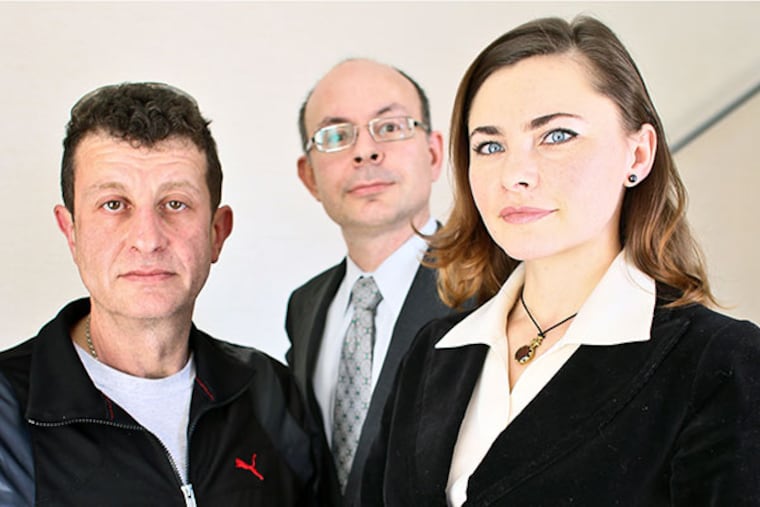How can my loved one in Ukraine come here?
Local Ukrainian-Americans are seeking to bring their relatives in their strife-torn home country to the Philadelphia area.

FOR WEEKS, Semyon Bluzer's daughter has lived captive in her apartment in downtown Kharkiv in eastern Ukraine, just 25 miles from the Russian border.
"At 5:30, she goes home and locks the door," said Bluzer, a Ukrainian-American who lives in Northeast Philadelphia.
Bluzer's nightmare predictions that pro-Russian separatists would seep into eastern Ukraine, destabilize the region and try to take hold of cities like Kharkiv, his hometown, have been unfolding into a scary reality.
On Sunday, pro-Russian activists barged into government buildings in three cities in eastern Ukraine - Kharkiv, Donetsk and Luhansk - sparking fears among some that Russia is planning to gobble up other parts of Ukraine, after its annexation of Crimea last month following a disputed referendum.
"Everybody sounds like [they're] worried a lot," said Bluzer, 52, who is desperately trying to get a visa for his 27-year-old daughter, Yulia Bratkov, to come live here.
"She's scared. Because of the whole situation. A lot of fights going on in the city," Bluzer said earlier this week. "I feel just like if you're going to a hospital, on a scale of one to 10, it's a 10," he said, referring to his level of pain.
Ukrainian security forces on Tuesday regained control of the administration building in Kharkiv, the country's second-largest city.
Bluzer is among many of Ukrainian descent in the Philadelphia area who are worried about relatives in their home country.
He, like other Ukrainian-Americans, has been trying to find a quick way to bring his loved one here, to a land of safety, away from the possibility of another European war.
Unfortunately, there is no realistic, quick way for that to happen.
Bluzer applied in 2012 for his daughter to immigrate here through family sponsorship. The petition was recently approved by the U.S. Citizenship and Immigration Services, he said.
But now his daughter needs to wait in line for her immigrant visa. And the current visa-processing time for an unmarried adult daughter of a U.S. citizen is another five years, according to Francois-Ihor Mazur, Bluzer's lawyer.
'Ears were getting red'
Mazur and his wife, Iryna Mazur, his assistant, have received numerous calls from people here looking to bring their relatives in Ukraine to the Philadelphia area.
"My ears were getting red," said Iryna Mazur, who is Ukrainian-American.
As a general adviser for the Ukrainian Federation of America, Iryna Mazur goes to its office twice a week in Jenkintown. On some days, as many as 30 to 50 people have asked her about ways they can bring their relatives or friends here, she said.
HIAS (Hebrew Immigrant Aid Society) Pennsylvania in Center City has also received numerous calls from worried Ukrainian-Americans.
"Every day, there are phone calls from relatives and friends," said Raisa Davidovich, an accredited representative at HIAS who handles family petitions.
HIAS has been helping Irina Gubov, 52, a Ukrainian-American in Northeast Philadelphia, try to bring her 77-year-old mother here. She lives in Nikolaev, in southern Ukraine.
She is old, alone and scared, said Gubov, who frets about her mother's safety.
Davidovich said this week that the petition for Gubov's mother to immigrate here, filed last year, was approved, but it will still take months for her to get a visa.
The Philadelphia area has one of the largest Ukrainian communities in the country, according to community members.
An estimated 43,000 people of Ukrainian ancestry live in Philadelphia and its four surrounding Pennsylvania counties, according to the Census Bureau's 2012 American Community Survey. That includes about 13,500 people in the city, many in Northeast Philadelphia.
But Zenia Chernyk, chairwoman of the board of directors of the Ukrainian Federation of America, says the census figures are "grossly underestimated." She says the "number is much larger, closer to 100,000" who live in the Philadelphia area.
Seeking security
Applying to come to the U.S. as a refugee from Ukraine is not a viable option for Bluzer's daughter now, said Francois-Ihor Mazur, who has offices in Philly and Feasterville, Bucks County.
To apply for refugee status, a person needs to show he or she is being persecuted by the government or by someone the government can't control.
"Once the old leadership was expelled, the case for refugee status went away" for his opponents, said Mazur, referring to Ukraine's former president, Viktor Yanukovych, who fled the country in February.
Under current refugee law, Ukrainians can still move internally, Mazur said.
He and other immigration lawyers have also been getting calls from Ukrainians who are not in lawful status here - for instance, people who overstayed tourist visas - asking if they can apply for asylum.
"General strife in a country by itself is not a basis for asylum," Mazur said.
Judith Bernstein-Baker, HIAS Pennsylvania's executive director, added: "There are no changes in refugee policy or immigration law that allow Ukrainian nationals to immigrate here due to political unrest in their country.
"However, Ukrainians who are members of religious minorities who have suffered persecution in the past and have first-degree relatives residing in the United States may be able to apply for the refugee program" under what's known as the Lautenberg Amendment.
Mazur said if things really become grave in Ukraine, he would expect Ukrainians to seek refuge in neighboring Poland. Bluzer, however, doesn't think it would be safe for his daughter to go cross-country to get to the western border.
Another option for his daughter might be Canada. "Given the circumstances, it's something worth looking into," Mazur said. "Canada could open its doors."
"I don't mind, as long as she's going to get out of this mess," Bluzer said. "Any place she's going to be secure, I will be happy."